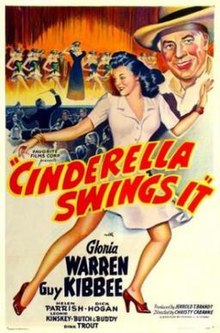Cinderella Swings It
| Cinderella Swings It | |
|---|---|

Theatrical poster for the film
|
|
| Directed by |
Christy Cabanne John E. Burch (assistant) |
| Produced by | Jerrold T. Brandt |
| Screenplay by | Michael L. Simmons |
| Based on | the series of stories about "Scattergood Baines" by Clarence Budington Kelland |
| Starring |
Guy Kibbee Gloria Warren |
| Music by | Paul Sawtell |
| Cinematography | Arthur Martinelli |
| Edited by | Richard Cahoon |
|
Production
company |
Pyramid Pictures
|
| Distributed by | RKO Radio Pictures |
|
Release date
|
|
|
Running time
|
69 minutes |
| Country | United States |
| Language | English |
Cinderella Swings It is a 1943 American comedy-drama film directed by Christy Cabanne from the screenplay by Michael L. Simmons, based on the series of short stories by Clarence Budington Kelland centered on "Scattergood Baines". Produced and Distributed by RKO Radio Pictures, it was released on January 22, 1943 and stars Guy Kibbee and Gloria Warren. It was the last of the six films in the Scattergood series, and its name was changed from Scattergood Swings It, since the franchise was not doing well.
Scattergood Baines is a local merchant in the New England town of Coldriver. To support the war effort, he donates a tract of land to the army and organizes the local civilian defense team. In addition, when a local bandleader, Tommy Stewart, is upset over not being able to enlist until he graduates, Scattergood suggests that Stewart and his female friend, Sally Benson, organize a local show to support the USO.
Meanwhile, the local music teacher, Professor Vladimir Smitken, believes his niece, Betty Palmer, has a good enough classical voice to attempt to make it in New York City. Using all of his meager savings, he takes Betty to New York, where he has arranged for her to audition for a Broadway producer, Brock Harris. Harris is less than impressed with Betty's voice, and she and Smitken return to Coldriver, Smitken in a very bad financial state. To cheer Betty up, Scattergood, along with some support from Stewart, convinces her to appear in the show Stewart and Sally are putting together. Scattergood also convinces Betty that she should switch from singing classical music to more modern swing tunes. As Betty practices for the show, a romance blossoms between her and Stewart, which makes Sally jealous, as she looked on Stewart as her personal property. To hinder Betty's budding relationship, Sally constructs several roadblocks in an attempt to prevent her from being in the show.
When Scattergood discovers Smitken's financial difficulties, he decides try to do something to help the professor out. He learns that the Broadway producer Harris is an avid fisherman. He travels to New York and convinces Harris to return to Coldriver with him, selling him on the area's excellent fishing. Once he has Harris in the area, he contrives excuse after excuse in order to keep him there, delaying him long enough so that he is still in town when Stewart's show is going on. Since he has several hours to kill before he has to board a train back to the city, Scattergood convinces Harris to attend the USO benefit show. Despite Sally's attempts to derail her, Betty appears in the show, and this time wows Harris with her performance of swing tunes. Harris immediately signs her for his next Broadway production after the show.
...
Wikipedia
